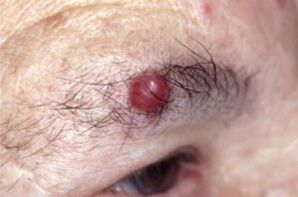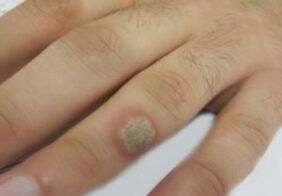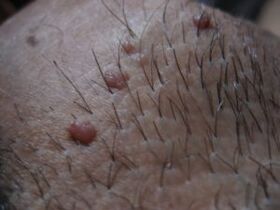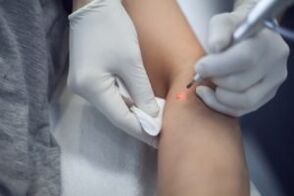
The virus of human papillomes (HPV) is exclusively in the basin layer of the skin, and its reproduction occurs in the upper layers.This disease is characteristic of your chronic form with periodic relapse.
Read more about HPV, his description
HPV has been infected with more than half of the world's population.Some of them are simply the bearers of the disease, while in others this virus is manifested as a papillomatose of the skin, mucosa.Sometimes this viral disease can be a pathogen cell cancer.HPV is a papoviride family infection that can infect and change epithelial cells.This benign neoplasm was formed in any area of the body:
- neck;
- under the chest;
- on the stomach;
- face;
- on the genitals;
- in axillary immersions;
- on the mucosa of oral, nasal cavities, lips;
- on the mucosa of internal authorities.
This infection belongs to intracellular parasites that are unable to play independently and use the cells of the human body for it.The virus introduces its DNA in human chromosomes and so long is parasing.You can observe the notable activation of this disease with the fall of immunity.This fact determines the need to treat HPV.The development of this infection occurs in the cells of the body, but it can be outside it, but not long.Being in cells live an organism, causes failure in their division.

Incubation period and stage of development
The virus incubation period is different.This type of virus is characterized by hidden current.The subclinic form of the course of the disease is characteristic of the appearance of the inconspicuous during the simple testing of the rash that cause the patient discomfort in the genital area.You can immediately infect several papillomavirus varieties.Under the influence of some factors, the virus is activated, and its reproduction begins, and the disease enters the period of clinical events.In 90% of cases, a chronic current course with the high probability of malignancy may occur in some cases a year.The disease is done in four phases (phases):
Phase 1 (beginner) - Latent flow of papillomavirus infection.The virus is in the body, but does not appear, does not cause transformation in cells.At this stage, PCR analysis can be identified;
2 - Clinical signs occur - in the form of skin growth.The virus causes an accelerated division of epidermal cells.At this stage, the virus is revealed during PCR, Cytology and Histology (discovered by the presence of hypercheratosis);
3 - Displasia.Cell structure (collocitosis) changes - this is visible under a microscope, because the DNA virus starts communicating with DNA cells and cause the development of such a - corded, integrated form.For diagnostics, PCR, cytology and histology methods are used as well as colpososcopy;
Phase 4 - cancer.The development of the virus causes cell mutation and the appearance of malignant cells.Invasive cancer is formed.The diagnosis occurs in all the above methods and on clinical events.
Types of HPV
More than a hundred types of HPV which infect the urogenetic tract of a person influencing the epithelial of the skin and the genital staff - 35 species.For all types of HPVs, classification is used based on the type of manifestation, rashes and other skin manifestations.Tipping HPV with description looks like this:
- Different types of nipples - HPV type 1-5 is responsible for their appearance.
- Subcanary nipples (they look like corn) -1-4 types of HPV.They are usually formed in those places where corn or compression occurs.In such places, the skin becomes thicker and when you press, causes unpleasant sensations.Such nipples do not transfer themselves and need surgical removal.There are two subtons of platonic nipples.One species slide deep into the fabric and a lot of pain, the other species resembles multiple growth, as if gliding one after another - this type of nipple doesn't even bring a sense of pain
- Flat nipples - 3, 5, 10, 28, 49 species.The most common palms, face are striking.They are usually located in young people and that is why this type of nipples is called youthful.The body is often carried with this infection;
- Ordinary nipples - 27 types of HPV;
- Vulgar nipples - type 2 virus (usually only the body is carried with this type of virus).Transmitted in an internal way;
- Spicy nipples that affect vagina, vulva, genitals, uterus, anus, can be on the head of the penis, on the skin of the backgrounds, their location in respiratory roads are - Typs 6, 11, 13, 16.18, 33, 35;
- HPV high oncogenic risk, causing precision - 39 types;
- The established epidermodisplasia was found.It can be of two types: named HPV 5, 8, 47 - Skin Cancer in 9 cases of 10, this virus is in patient's blood, another type caused by HPV 14, 20, 21, 25 usually causes benign neoplasms;
- Laryngeal papillomatosis - type 11 virus.He is usually transferred from his mother to a child, but it is possible to infect the oral village.Causes difficulty swallowing, rough voice, if the amount of papillom is large, breathing is worse;
- Bowenoid Papulez.This type is caused by 16, sometimes 18, 31-35, 42, 48, 51-54 with the types of HPV.Representatives of male half may appear most often, which have a lot of sexual partners.Outside, these formations look like semicircular or straight growth with a smooth or rough surface, the color is different - from completely light to almost black.The disease can go alone, it's a neo -info type of virus.

Symptoms and specifics of HPV in men, women and children
In order to overcome the infection in the early stages, human immunity is quite strong.The most often disease is not developed and a person does not doubt the presence of HPV, because external symptoms may not appear.But after a while (months or years), some signs of HPV infection can occur.Statistics indicates only 5-10% of those who have external symptoms of HPV (human papillomavirus).The disease continues to asymptomatic - most diseases have no signs of disease.When activating the virus, the growth of different species that speak about the presence of different species in the body may occur.Localization sites also speak of the type of virus.For example, papillomas have the shape of soft elongated growth (threaded warts) that are attached to the leg, the color cannot be distinguished from the skin color, but it is also pigmented.Balch - growth that can occur, soft on the touch of pink color can occur.
In women, the specifics of the disease are such that the development of the disease may occur in a hidden form, but sometimes causes the creation of genital papillomes.Once the virus is infected, a woman cannot adhere to the symptoms until the beginning of the menopause, at the moment, the virus can cause malicious cells of the genital organ mucosa.To prevent the development of cervical cancer caused by the presence of HPV, a regular examination by doctors will help.Since this disease cannot be manifested.In children, influenced by viruses, skin warts, larynx papillomatosis (usually in chronic return) can be developed.Larinka papillomatosis causes breathing problems, to suffocating syndrome.Leather nipples are present in 12% of school children, it is the most common dermatological disease in children.

HPV and pregnancy
HPV in pregnant women is not the most dangerous disease for himself and an unborn child.The father's mother should only be careful if he found 6 or 11 VPV types (causing genital or anal condujul), which, when transmitted in the newborn, may have consequences in the form of respiratory papillomatosis.In the presence of condonno in such an amount or places that interfere with the expulsion of the fetus, it is possible to prescribe Cesarean, because during the ordinary birth, condyloma can cause bleeding development.All other forms of papillomes (abnormatous lesions) are not -hadryus for the child and the course of pregnancy.
Diagnostics and whom should you contact
The following research methods are used to diagnose papillomavirus:
- Personal examination of the patient;
- blood test;
- Colposcopy;
- Tsytology small-pap test;
- Tissue histology;
- PCR is a polymerase chain reaction.This analysis allows not only to learn about the presence of the virus, but also to determine its type.But if analysis is positive, it doesn't mean that this type of HPV will not pass alone.This analysis also determines all types of papillomavirus;
- urethroscopy;
- Biopsy.

If in the form of rash in the form of a rash, the patient has no complaint, and the presence of the DNA HPV is determined only by analyzes - can come from a transient viral infection (a person is carrier).Due to the fact that HPV can be the cause of diseases of different authorities, if any, doctors of different directions.In the presence of nipples on the skin faces and bodies are rotating dermatologists.With planting nipples - a dermatologist or surgeon.With condylomas in men - urologist (surgeon), for women - a gynecologist (surgeon).If condylomas are present in the anus area, then you must contact the proctologist.If the nipples of epidermodisfelia is suspected, then to a dermatologist or oncologist.Laringeal papillomatosis requires an appeal of otolaryngologist or surgeon, a Boenoid Papulosis - you have to contact urologist or Venetail.A differential diagnosis is also required, such as micropapylomatosis, vestibular papillomatoses - they, unlike HPV, do not require treatment, because the similarities of external signs are the variant of the anatomical norm.Deciphering the normative values of the blood test will be shown by the absence of HPV.
Treatment
So, is it fully treated with HPV or not?Today, no antivirus drug is known to remove HPV from the body.Different interferons and other drugs of this series - only reduce existing condyloms, but do not reduce the frequency of new ones.The main method of treatment is to remove papillom.The main methods of removal are as follows:
- Surgical.It is performed in local anesthesia;
- Radio surgical.The tumor is cut off with the radio wave electrode, the vessels were coagulated.Once an antiseptic bend is made;
- Laser.This method is contactable and bloodless.At the point of removal, the bark happens below it.Lack of methods is a high risk of recurring disease, a relatively high price and the need to grind the remaining scars;
- Electrical agulating.According to the results and efficiency, it is similar to the previous two ways;
- Cryoagulation.Full removal of papillom occurs after several sessions.
Although with the help of these methods, viral external events are completely removed, this is not considered an absolute disposal of infection, but only a cousin, because a person does not stop being a virus bracket, and after a period of nipples it can reappear.There is no universal method of inoperative treatment for all patient categories (men, women and children).Only laser removal can be considered an alternative.But when applying, there is a risk of malignancy (malignancy) of papillom.After surgery, the patient was prescribed by the infusion of a single dose of steroid medicine, which prevents swelling, and antibiotics are also prescribed to avoid wound infection.During the therapy, HPV should completely stop sex life to full medicine, as well as conduct an exam and, if necessary, treatment, partners.

Treatment at home and folk drugs
In addition to traditional treatment methods, I use others that are officially recognized as a medicine and which can be performed at home:
- Processing of warts with salicylic acid.Every day, nipples should be treated with acid (15-20%).This method has one deficiency - processing should be done quite a long time;
- Cremar processing.They are lubricated with nipples three times a week.But when used, it is possible to feel itching, erosion, redness of the skin is possible;
- Retinoids in the form of cream.They handle nipples - 12 weeks.Its use is also prohibited during pregnancy;
- Injection in the focus of infection once in 7 days, within three to four weeks. The use is prohibited during pregnancy;
- Cautical nipples, papillomes and destroy pathogenic microbes.The beard should be processed permanently within an hour.Then a break is made for a week, and processing is carried out.If the papilloma does not disappear, after 14 days, another processing was performed, and so no more than 4 procedures.It is forbidden to use in senile nipples and in pediatrics;
If we are talking about the treatment of clean folk remedies, then the use of the Celand has gained great popularity.His juice is treated with nipples several times a day.When it darkens, dark skin is removed and continued to spoil further until the wart is removed.
Disease prevention
The main prevention measures are considered:

- Compliance with personal hygiene in public places;
- Compliance with a healthy lifestyle, maintaining immunity;
- One permanent sexual partner, in a sexual relationship with an unchecked partner - uses a condom;
- sufficient intake of vitamins;
- Lead sex life not earlier than 18 years, when the old maternal mucosa is already ripe and can be protected;
- Avoid artificial termination of pregnancy and rough gender;
- In time, the inflammatory diseases are treated.
During vaccination, sometimes some side effects in the form of deterioration, fever, redness of the skin can be observed, redness at the place of introduction of vaccines.















